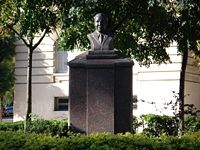
Carlos Bernardo Gonzalez Pecotche
Encyclopedia
Carlos Bernardo González Pecotche (August 11, 1901 in Buenos Aires
-April 4, 1963), also known as Raumsol, was an Argentine
humanist
and thinker
. He created and developed Logosophy
in 1930.
He founded the first Logosophical Cultural Center on August 11, 1930, in the city of Córdoba
, Argentina. Afterwards he implemented the creation of many other logosophical centers of study in Argentina
, Uruguay and Brazil
. He was the editor of two magazines (Aquarius, 1931–1939, and Logosofía, 1941–1947) and a newspaper (El Heraldo Raumsólico, 1935–1938), committed in teaching and divulging logosophical knowledge. He gave more than a thousand conferences and classes in Argentina
, Uruguay and Brazil
maintaining, during his life, extensive and comprehensive contact with scholars of Logosophy all over the world, as well as with intellectuals in South America and Europe. He wrote several books concerning Logosophy in several genres.
He also created the Logosophical Educational System, which today has 7 schools in Brazil, 2 in Argentina and 1 in Uruguay. These schools apply the logosophical pedagogy
.
 The city of Buenos Aires (Argentina) has paid him an homage with a plate on the Portugal Plaza and with a Plaza that takes his name, near the National Library.
The city of Buenos Aires (Argentina) has paid him an homage with a plate on the Portugal Plaza and with a Plaza that takes his name, near the National Library.
Buenos Aires
Buenos Aires is the capital and largest city of Argentina, and the second-largest metropolitan area in South America, after São Paulo. It is located on the western shore of the estuary of the Río de la Plata, on the southeastern coast of the South American continent...
-April 4, 1963), also known as Raumsol, was an Argentine
Argentina
Argentina , officially the Argentine Republic , is the second largest country in South America by land area, after Brazil. It is constituted as a federation of 23 provinces and an autonomous city, Buenos Aires...
humanist
Humanism
Humanism is an approach in study, philosophy, world view or practice that focuses on human values and concerns. In philosophy and social science, humanism is a perspective which affirms some notion of human nature, and is contrasted with anti-humanism....
and thinker
Thinker
Thinker may refer to:*Intellectual, one who tries to use his or her intellect to work, study, reflect, speculate on, or ask and answer questions with regard to a variety of different ideas...
. He created and developed Logosophy
Logosophy
Logosophy is an ethical-philosophical doctrine developed by the Argentine humanist and thinker Carlos Bernardo González Pecotche, which offers teachings of conceptual order and practices that lead oneself to self cognition and self improvement through a process of conscious evolution.Logosophy...
in 1930.
Biography
González Pecotche was a son of Jorge N. González and Maria Pecotche de González. He married Paulina Eugenia Puntel on October 8, 1924 and had a son, Carlos Federico González Puntel, born on July 10, 1925.He founded the first Logosophical Cultural Center on August 11, 1930, in the city of Córdoba
Córdoba, Argentina
Córdoba is a city located near the geographical center of Argentina, in the foothills of the Sierras Chicas on the Suquía River, about northwest of Buenos Aires. It is the capital of Córdoba Province. Córdoba is the second-largest city in Argentina after the federal capital Buenos Aires, with...
, Argentina. Afterwards he implemented the creation of many other logosophical centers of study in Argentina
Argentina
Argentina , officially the Argentine Republic , is the second largest country in South America by land area, after Brazil. It is constituted as a federation of 23 provinces and an autonomous city, Buenos Aires...
, Uruguay and Brazil
Brazil
Brazil , officially the Federative Republic of Brazil , is the largest country in South America. It is the world's fifth largest country, both by geographical area and by population with over 192 million people...
. He was the editor of two magazines (Aquarius, 1931–1939, and Logosofía, 1941–1947) and a newspaper (El Heraldo Raumsólico, 1935–1938), committed in teaching and divulging logosophical knowledge. He gave more than a thousand conferences and classes in Argentina
Argentina
Argentina , officially the Argentine Republic , is the second largest country in South America by land area, after Brazil. It is constituted as a federation of 23 provinces and an autonomous city, Buenos Aires...
, Uruguay and Brazil
Brazil
Brazil , officially the Federative Republic of Brazil , is the largest country in South America. It is the world's fifth largest country, both by geographical area and by population with over 192 million people...
maintaining, during his life, extensive and comprehensive contact with scholars of Logosophy all over the world, as well as with intellectuals in South America and Europe. He wrote several books concerning Logosophy in several genres.
He also created the Logosophical Educational System, which today has 7 schools in Brazil, 2 in Argentina and 1 in Uruguay. These schools apply the logosophical pedagogy
Pedagogy
Pedagogy is the study of being a teacher or the process of teaching. The term generally refers to strategies of instruction, or a style of instruction....
.
Acknowledgments


